
Aung San Suu Kyi, sometimes abbreviated to Suu Kyi, is a Burmese politician, diplomat, author, and a 1991 Nobel Peace Prize laureate who served as State Counsellor of Myanmar and Minister of Foreign Affairs from 2016 to 2021. She has served as the general secretary of the National League for Democracy (NLD) since the party's founding in 1988 and was registered as its chairperson while it was a legal party from 2011 to 2023. She played a vital role in Myanmar's transition from military junta to partial democracy in the 2010s.

Myanmar, officially the Republic of the Union of Myanmar, also known as Burma, is a country in Southeast Asia. It is the largest country by area in Mainland Southeast Asia and has a population of about 55 million. It is bordered by Bangladesh and India to its northwest, China to its northeast, Laos and Thailand to its east and southeast, and the Andaman Sea and the Bay of Bengal to its south and southwest. The country's capital city is Naypyidaw, and its largest city is Yangon.

Historically strained, Myanmar's foreign relations, particularly with Western nations, have improved since 2012. Relations became strained once more in 2017 with the Rohingya genocide and due to the 2021 Myanmar coup d'état. Myanmar has generally maintained warmer relations with near states and is a member of the Association of Southeast Asian Nations.
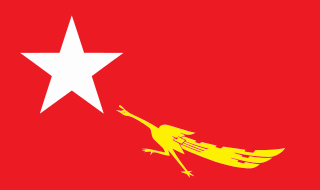
The National League for Democracy is a deregistered liberal democratic political party in Myanmar (Burma). It became the country's ruling party after a landslide victory in the 2015 general election but was overthrown in a military coup d'état in early 2021 following another landslide election victory in 2020.

Burma Campaign UK founded in 1991 is a London-based non-governmental organisation (NGO) that aims to achieve the restoration of basic human rights and democracy in Burma. BCUK campaigns on behalf of the Burmese pro-democracy movement and is the largest campaigning organisation for Burma in Europe. The Financial Times has called it "a leading human rights pressure group".
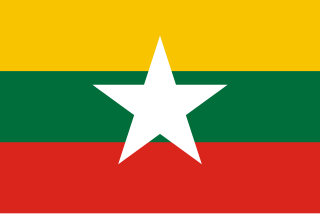
The National Coalition Government of the Union of Burma was an administration which claimed to be the government in exile of Burma (Myanmar). It had its headquarters in Rockville, Maryland, United States. It was formally established in December 1990, with Sein Win as its first prime minister. It was dissolved in September 2012.
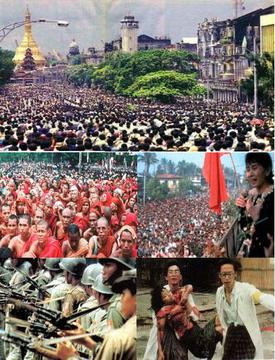
The 8888 Uprising, also known as the People Power Uprising and the 1988 Uprising, was a series of nationwide protests, marches, and riots in Burma that peaked in August 1988. Key events occurred on 8 August 1988 and therefore it is commonly known as the "8888 Uprising". The protests began as a student movement and were organised largely by university students at the Rangoon Arts and Sciences University and the Rangoon Institute of Technology (RIT).
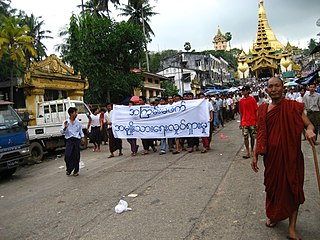
The Saffron Revolution was a series of economic and political protests and demonstrations that took place during August, September, and October 2007 in Myanmar. The protests were triggered by the decision of the national military government to remove subsidies on the sales prices of fuel. The national government is the only supplier of fuels and the removal of the price subsidy immediately caused diesel and petrol prices to increase by 66–100% and the price of compressed natural gas for buses to increase 500% in less than a week.
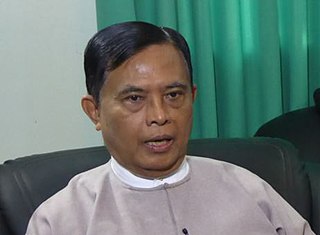
Aung Kyi is a Burmese politician and veteran serving as chairman of Anti-Corruption Commission of Myanmar. He previously served as the Minister of Information, Minister of Labor, Minister of Social Welfare, Relief and Resettlement in the Cabinet of Burma. He was appointed as the Minister of Labor on 24 October 2007 by the then ruling State Peace and Development Council. In October 2007, he received an additional, concurrent appointment as minister for relations to detained National League for Democracy leader Aung San Suu Kyi.
The following lists events in the year 2017 in Myanmar.

The Rohingya genocide is a series of ongoing persecutions and killings of the Muslim Rohingya people by the military of Myanmar. The genocide has consisted of two phases to date: the first was a military crackdown that occurred from October 2016 to January 2017, and the second has been occurring since August 2017. The crisis forced over a million Rohingya to flee to other countries. Most fled to Bangladesh, resulting in the creation of the world's largest refugee camp, while others escaped to India, Thailand, Malaysia, and other parts of South and Southeast Asia, where they continue to face persecution. Many other countries consider these events ethnic cleansing.

The Rohingya genocide is a term applied to the persecution—including mass killings, mass rapes, village-burnings, deprivations, ethnic cleansing, and internments—of the Rohingya people of western Myanmar.
The Special Envoy of the Secretary-General on Myanmar is a special Representative of the Secretary-General of the United Nations created in 2018 to respond to the Rohingya genocide starting in August 2017 and its effects in Myanmar. According to the mandate established by the UN General Assembly in its resolution 72/248 in 2017, the Special Envoy "works in close partnership with all stakeholders including local communities and civil society, and regional partners, notably the Government of Bangladesh and the Association of Southeast Asian Nations (ASEAN), regional countries, and the broader membership of the United Nations."

General elections were held in Myanmar on 8 November 2020. Voting occurred in all constituencies, excluding seats appointed by or reserved for the military, to elect members to both the upper house - Amyotha Hluttaw and the lower house - Pyithu Hluttaw of the Assembly of the Union, as well as State and Regional Hluttaws (legislatures). Ethnic Affairs Ministers were also elected by their designated electorates on the same day, although only select ethnic minorities in particular states and regions were entitled to vote for them. A total of 1,171 national, state, and regional seats were contested in the election, with polling having taken place in all townships, including areas considered conflict zones and self-administered regions.

A coup d'état in Myanmar began on the morning of 1 February 2021, when democratically elected members of the country's ruling party, the National League for Democracy (NLD), were deposed by the Tatmadaw — Myanmar's military — which then vested power in a military junta. Acting president Myint Swe proclaimed a year-long state of emergency and declared power had been transferred to Commander-in-Chief of Defence Services Min Aung Hlaing. It declared the results of the November 2020 general election invalid and stated its intent to hold a new election at the end of the state of emergency. The coup d'état occurred the day before the Parliament of Myanmar was due to swear in the members elected at the 2020 election, thereby preventing this from occurring. President Win Myint and State Counsellor Aung San Suu Kyi were detained, along with ministers, their deputies, and members of Parliament.

The chairman of the State Administration Council is the head of Myanmar's ruling military junta, established in the 2021 coup d'état. Min Aung Hlaing is the current holder of the office, and also serves as the prime minister of the Provisional Government.
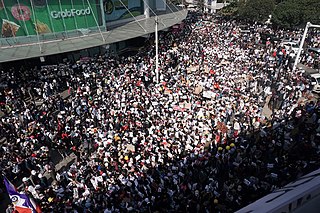
Protests in Myanmar, known locally as the Spring Revolution, began in early 2021 in opposition to the coup d'état on 1 February, staged by Min Aung Hlaing, the commander-in-chief of the country's armed forces, the Tatmadaw. As of 23 June 2022, at least 2000 protesters have been killed, 14,000 currently arrested and 700,000 displaced by the junta.
Sean Turnell is an Australian economist and former economic policy advisor to State Counsellor Aung San Suu Kyi in Myanmar. He is also an honorary professor of economics at Macquarie University, a former staff member of the Reserve Bank of Australia, and the director of research at the Myanmar Development Institute.
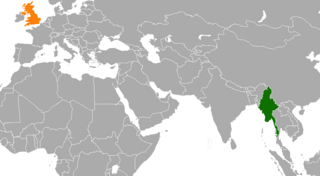
Myanmar–United Kingdom relations are the bilateral and diplomatic relations between Myanmar and the United Kingdom. Myanmar has an embassy in Mayfair, London, whilst the United Kingdom operates an embassy in Yangon.
Events in the year 2022 in Myanmar.














